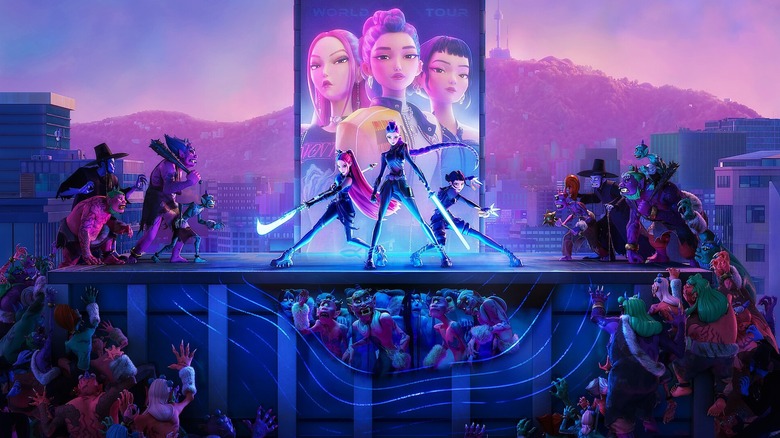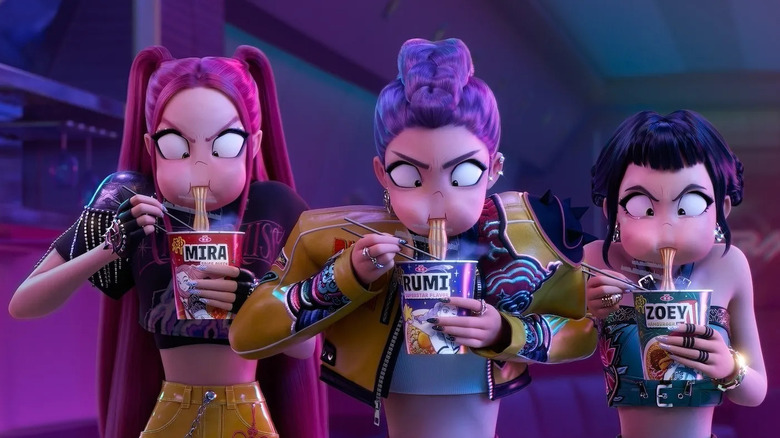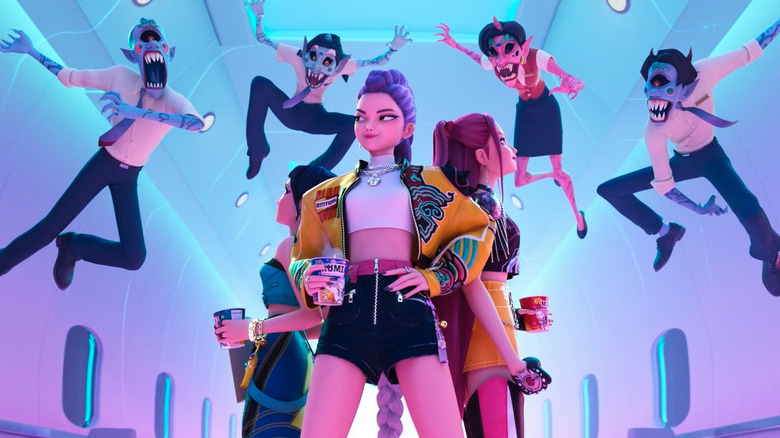Netflix's New Chart-Topping Movie Proves Animation Can Still Thrive
Let's not sugarcoat it — original animation is in a bit of a rough spot these days. Between the gut-punch cancellation of the Emmy Award-winning "The Tiny Chef Show," Pixar's "Elio" floundering at the box office opening weekend (I'm still hoping for an "Elemental" comeback narrative), the endless parade of live-action remakes hollowing out the animated classics we grew up on, and Max removing the original episodes of "The Looney Tunes" for some godforsaken reason, things are looking, well ... bleak! But among the internet thinkpieces and the "RIP Original Animation" hashtags, the sky-is-falling hysteria is wildly premature. Case in point: "KPop Demon Hunters" is out here absolutely thriving, and it's not playing by anyone's dusty old rules.
The latest team-up between Netflix and Sony Pictures Animation, the glitter-drenched, demon-slaying spectacle "KPop Demon Hunters" is the follow-up from the latter company's Academy Award-nominated "Spider-Man: Across the Spider-Verse." Instead of bringing to life a beloved piece of IP, the film centers on a K-pop girl group called HUNTR/X, comprised of pop idols Rumi (Arden Cho/EJAE), Mira (May Hong/Audrey Nuna), and Zoey (Ji-young Yoo/Rei Ami). The trio is not only one of the most popular musical acts in the world, but they're also the latest in a long lineage of demon hunters tasked with using their musical gifts to maintain the Honmoon barrier that seals demons — and their leader, Gwi-Ma ("Squid Game" villain Lee Byung-hun) — from the human world.
Under the confident direction of Maggie Kang (in her feature debut) and co-director/writer Chris Appelhans, "KPop Demon Hunters" explodes onto the screen as a genre-smashing animated musical with legit Oscar-bait songs, stunning, inventive animation, and an emotionally resonant story about identity, resilience, and beating the odds with rhythm and righteous fury. It has everything a person could want in an animated film, and based on its stellar performance on Netflix, audiences are showing up en masse.
KPop Demon Hunters evolves the familiar into something fresh
"KPop Demon Hunters" wears its influences like a bedazzled badge of honor, with flavors of "Buffy the Vampire Slayer," "Totally Spies," "The Powerpuff Girls," and anime swirled in for good measure. Yet what could've been a derivative mashup instead lands as a smart, thematically resonant remix. Rumi's arc, in particular, is an exploration of generational obligation and accepting even the darkest truths about her existence, while also juggling everyday challenges of just existing in the world. Incorporating it into the entertainment landscape of K-pop — which has become increasingly influential for American audiences (you can thank "The White Lotus" star and BLACKPINK member Lisa for the current Labubu craze) — gives the film global relevance and a decidedly now sensibility. So many films these days are desperately trying to evoke feelings of yesteryear or repeat time-honored formulas verbatim, but "KPop Demon Hunters" evolves the familiar into something thrillingly fresh.
A major part of the film's success comes courtesy of Sony Pictures Animation, which continues its reign as a stylistic powerhouse. Following the boundary-pushing visuals of the "Spider-Verse" films and "The Mitchells vs. The Machines," this movie once again highlights the studio's mastery in mixing animation styles, textures, and tones. Every set piece dazzles, drenched in hyper-saturated color and kinetic detail — but it's the quieter, or more absurd character moments that truly shine.
The CG animation flirts with the expressive elasticity of classic 2D anime styles, delivering eye-popping facial contortions without sacrificing the futuristic gloss. Zoey, in particular, is a comedic revelation: whether sprouting anime-style shark teeth mid-rant or having her eyes morph into a six-pack (which then inexplicably becomes corn on the cob and eventually full-on popcorn) while ogling the Saja Boys — a K-pop demon boy band in disguise — she embodies the film's commitment to visual anarchy and narrative fun. The animation matches the frenetic, electric, and exhilarating worlds of both K-pop and demon hunting, and cements "KPop Demon Hunters" as one of the year's most gleefully original cinematic rides.
Streaming numbers prove audiences want original animation
When "Elio" underperformed relative to opening weekend projections, Doug Creutz, a media analyst at TD Cowen, told Deadline, "We expect movie studios to react to this clear trend by greenlighting fewer original IP animated films (don't blame film execs, blame audiences)." This assertion — that audiences are to blame for the declining box office performance of original animated features — is not only misguided, it's intellectually lazy. Audiences are not rejecting original animation; they are responding to a marketplace that has made such content increasingly inaccessible and unaffordable.
Just last month, "Lilo & Stitch" drew large crowds in its live-action reimagining — not solely because it's "recognizable IP" in an era where cultural complacency reigns, but because for families, it represents a lower-risk investment. If I were to purchase a single adult and two children's tickets to see "Elio" at my local theater at the earliest non-matinee screening (to accommodate parents having to work), it would cost me $59.04 — and that's before factoring in outlandishly pricy concessions. In our current economic climate, families are understandably risk-averse when it comes to what they're going to see in theaters. When marketing is minimal and a film lacks brand familiarity, people are far less likely to spend upwards of $70 on what feels like a gamble.
Meanwhile, "KPop Demon Hunters" is streaming on Netflix — instantly accessible to millions, without additional cost beyond the subscription and the ability to be enjoyed from the comfort of the couch. As much as I would have given a limb to see this in all of its big, beautiful glory on the big screen where it belongs, its success is undoubtedly credited to the accessibility of a streaming platform. This isn't an issue of audience apathy. It's a structural problem within a consolidated industry that has made theatrical experiences increasingly cost-prohibitive. Until that changes, original animated films will continue to thrive where accessibility prevails — and that's likely not going to be in movie theaters, but on streaming platforms.


